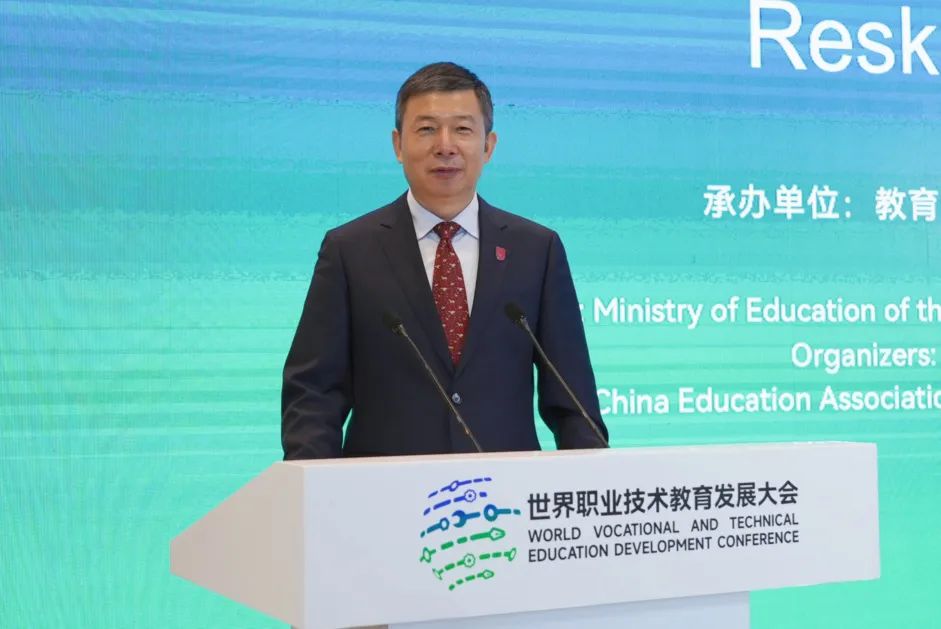 The World Vocational and Technical Education Development Conference was held in Tianjin on 19 and 20 August 2022. Chinese President Xi Jinping sent it a congratulatory letter which Vice Premier Sun Chunlan read on his behalf, along with a speech delivered via video link.
The World Vocational and Technical Education Development Conference was held in Tianjin on 19 and 20 August 2022. Chinese President Xi Jinping sent it a congratulatory letter which Vice Premier Sun Chunlan read on his behalf, along with a speech delivered via video link.
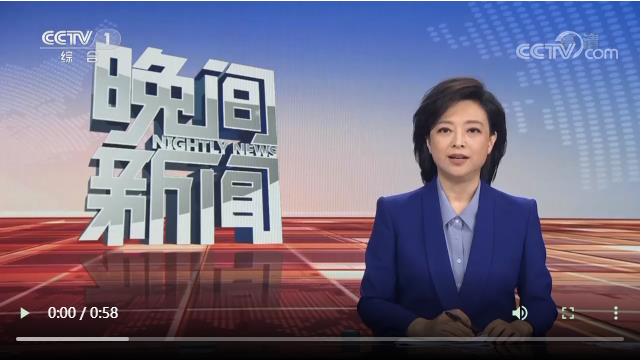
News of Vice Premier Sun Chunlan reading the president’s congratulatory letter (CNR News)
The event was hosted by the Chinese Ministry of Education, the Chinese National Commission for the United Nations Educational, Scientific and Cultural Organisation (UNESCO), and the Tianjin municipal government. Covering the topic “Vocational and Technical Education Development in the Post-pandemic Era – New Changes, New Ways and New Skills”, and the first of its kind, the event was attended by around 700 representatives of 123 countries and regions either onsite or online to plan the high-quality development of vocational education, with a white paper on vocational education in China and the Tianjin Initiative published, and extensive discussions taking place in the main forum and 14 parallel sessions. The attendees stated that the event would be effective in promoting vocational education both within China and via international collaboration.
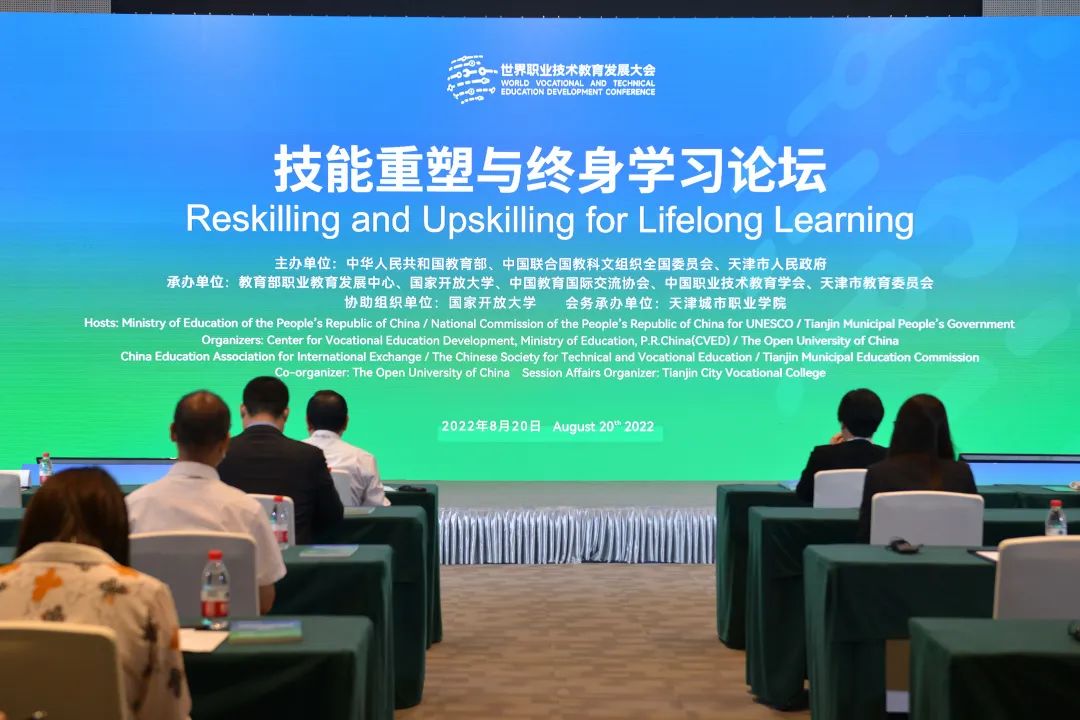
“Reskilling and Upskilling for Lifelong Learning” session
The Open University of China (OUC), one of the event organisers, helped set up a parallel session titled “Reskilling and Upskilling for Lifelong Learning”. It stood out from among the 13 other parallel sessions by encouraging communications concerning skill-systems building, as well as analysing skills-building strategies and promotion of lifelong learning for countries and communities.

Jing Degang, OUC president
Jing Degang, OUC president, delivered a welcome speech at the session of “Reskilling and Upskilling for Lifelong Learning”. Experts from nine countries and regions have made presentations, including David Atchoarena, director of the UNESCO Institute for Lifelong Learning; Gao Wenbing, president of China Adult Education Association; Pasupha Chinvarasopak, Minister Counsellor (Science and Technology) of Royal Thai Embassy, Beijing; Lamin B. Manneh, director of Quality Assurance, National Accreditation and Quality Assurance Authority, Gambia; Jonathan Ledger, Technical and Vocational Education and Training (TVET) and Chartered Bodies Specialist, Department for International Trade; Marcio Pochmann, president of the Institute of Lula; Wang Fei, director of Technical School Administration Division, Department of Vocational Capacity Building,Ministry of Human Resources and Social Security,P. R. China; Simon Culhane, chief executive of the Chartered Institute for Securities and Investment; Paul LAM Kwan-sing, president of Hong Kong Metropolitan University; Cheng Hongli, principal of Zhongguancun Institute; John Clayton, professor of Te Whare Wānanga o Awanuiārangi, New Zealand; André Burri, director of SwissSkills, Switzerland. The session was presided over by Fan Xianrui, OUC vice president.
Jing Degang said that President’s congratulatory letter pointed out a clear direction for the session. The Covid-19 pandemic has had a serious impact on economic development, employment, and people’s lives. It also poses severe challenges to global education systems, particular vocational education. In the post-pandemic era, the pattern of global vocational education has changed. Vocational and technical colleges dominated by traditional face-to-face campus teaching have entered a period of adaption to major adjustments and changes. It is clear that the experiences and practices of online education attained during the pandemic will be a new normal for the vocational education. Open universities dominated by online teaching must work to provide more flexible training and meet demand for lifelong learning. Over the past three years, the OUC has met the challenges of the pandemic, increasing enrolment by 8% for two consecutive years and enhancing both the quality and quantity of learning resources. However, questions remain as to how open universities can be integrated into vocational education, and how they can support reskilling for lifelong learning while maintaining their core competitive advantages.
Jing Degang said that in recent years, the OUC has accelerated digital transformation and intelligent upgrading by taking the mission of assisting “reskilling and upskilling” and “lifelong learning” and following the path of “Internet + University”. It has made substantial efforts to build a major platform for lifelong education, a major platform for online education, a platform for flexible education and a platform for international cooperation. Meanwhile, the OUC is currently implementing the Chinese central authorities requirements specified in the document Guidelines on Promoting the High-Quality Development of Modern Vocational Education, to build overseas study centres, striving to expand the development of degree education, external education and education for older adults for the construction of a shared community for mankind. The OUC is accelerating the implementation of “four transformations”. It has initiated the “digital strategic action” and launched a lifelong education platform. On 24 June 2022, the OUC’s One College Student Per Village” programme was awarded the 2020 UNESCO Prize for the Use of Information and Communication Technologies in Education – King Hamad Bin Isa AI-Khalifa Prize at the award ceremony held at the UNESCO headquarters in Paris. All these are attainments of experiences for the OUC in terms of “reskilling and upskilling” and lifelong learning.
“The OUC’s practices and explorations represent the epitome of innovations made by Chinese universities and their development in the transformation and reform”, Jing Degang added. It is expected that international cooperation will help cope with the transformation of reskilling and upskilling for lifelong learning in the global context, with China’s wisdom contributed to the reform and development of vocational education around the world.
Twelve experts gave advice on how to meet the continuous needs for reskilling and upskilling in reforms of lifelong learning. With the digital economy a new force of global economic development, education is being reconfigured accordingly, with new challenges faced in terms of adjustment and optimisation, and the goal being a new normal of vocational education that embraces the whole of society.
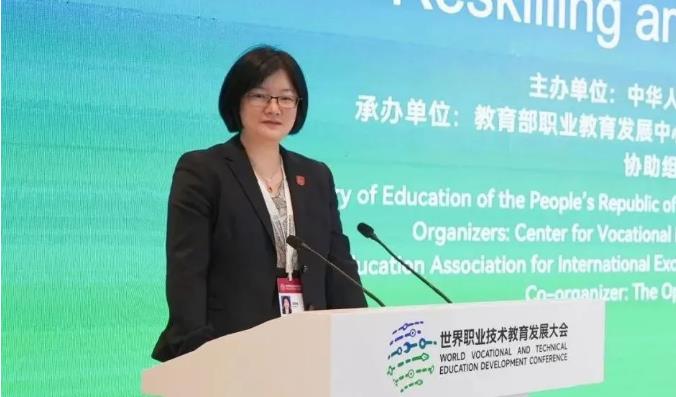
Fan Xianrui, OUC vice president
Fan Xianrui closed the session with an old Chinese saying: Not even mountains and oceans can separate people with shared goals and a shared vision. She expressed the hope that ties and communication could continue to be strengthened, with mutually advantageous collaboration and the use of digital technology to create a global lifelong-learning ecosystem, serving industrial optimisation, the stability of the global industrial supply chain, and an open world economy.
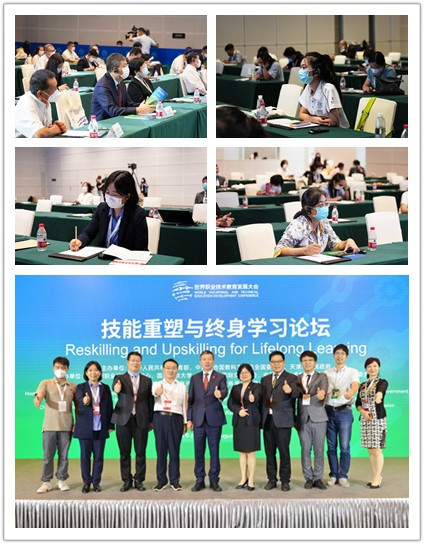
Glimpses of the session
Reprinted by OUC News Network from Distance Education in China